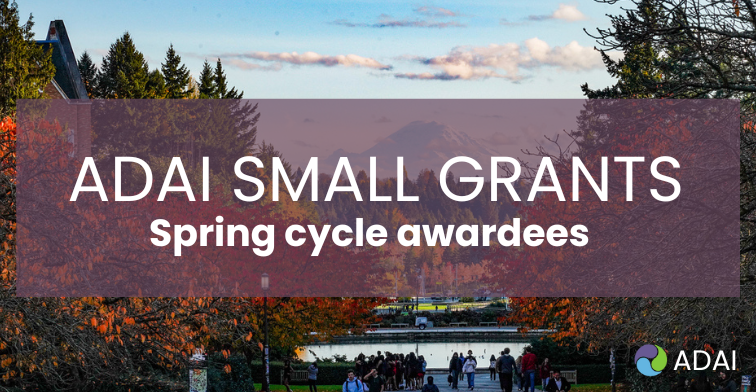ADAI Small Grant Awards for Spring 2025: Opioids and the Brain, Cannabis and Lactation, Asian American Youth Drinking, and Cannabis “Tolerance Breaks”
07/01/2025
ADAI is proud to announce the recipients of our Spring 2025 Small Grant awards, whose projects all start today!
Check out the four projects below to see what we’ll be learning about next:
Investigating Distinct Midbrain GABAergic Subpopulations in Opioid Reward Processing
Abigail Elerding
Graduate student, Dept of Pharmacology
Omar Koita, PhD
Senior fellow, Postdoctoral Fellow, Dept of Psychiatry & Behavioral Sciences
Mentor: Larry Zweifel, PhD (Psychiatry & Behavioral Sciences and Pharmacology)
Opioids are highly effective for treating short-term pain, but they also come with serious risks like addiction and physical dependence. These risks have contributed to a major public health crisis. To develop effective interventions to address this crisis, we need to better understand how opioids affect the brain.
This study will look at 3 genetically different types of GABA neurons found in the brain’s ventral tegmental area to uncover how each type influences dopamine release and addictive behavior. The goal is to better understand how this area of the brain is involved in opioid addiction, which could help lead to more targeted treatments.
Lactation Outcomes with Prenatal and Postpartum Cannabis Use
Rebecca Hoban, MD, MPH
Associate Professor of Pediatrics, Director of Breastfeeding Medicine
Sara Berkelhamer, MD
Professor of Pediatrics
Human milk is one of the best ways to support infant health and reduce health disparities. While people who use cannabis start lactation at similar rates as others, they often stop earlier, reducing the benefits their babies receive. The reasons for this are not well understood.
This project will use data from an ongoing study of cannabis use during pregnancy to compare people who use cannabis to those who don’t, looking at lactation goals and duration and whether cannabis use affects these patterns. They’ll also examine mental health and cannabis use to better understand the full picture. These findings will help guide future research and interventions to support lactation in this population.
Effects of Acculturative Stress on Drinking to Cope: Testing Bicultural Self-Acceptance and Social Support Interventions
P. Priscilla Lui, PhD
Associate Professor, Dept. of Psychology
Alcohol use is rising among Asian American young adults, yet they are often overlooked in research due to the “model minority” myth. Many in this group report drinking to cope with acculturative stress: the pressure of balancing Asian and American cultural expectations and dealing with societal bias.
Little is known about how these stressors lead to drinking, though, or how to effectively intervene. This study aims to explore the connection between acculturative stress and drinking to cope. Researchers will use virtual reality to simulate culturally stressful situations, then test two possible solutions: social support and bicultural self-acceptance. Findings will help shape culturally tailored strategies to prevent harmful drinking and support mental health in this underserved group.
Testing a Tolerance Break Intervention Among a High-Risk Sample of Young Adults Who Use Cannabis: A Randomized Control Trial
Katherine Walukevich-Dienst, PhD
Assistant Professor, Dept. of Psychiatry & Behavioral Sciences
Christine Lee, PhD
Research Professor, Dept. of Psychiatry & Behavioral Sciences
Cannabis use is common among young adults and can lead to problems like cannabis use disorder (CUD). One harm reduction strategy is taking a “tolerance break” (“T-break”), a planned break from cannabis to reset tolerance and reduce cannabis-related harms. To support this strategy, a 21-day T-break Guide was created – a free, self-guided workbook with daily modules. An initial pilot study showed it was promising, but more rigorous testing is needed.
This study will test the T-break Guide in a randomized controlled trial with 100 young adults (ages 18-29) who use cannabis daily and want to take a break. Researchers will look at how well participants engage with the Guide, whether it helps reduce cannabis-related harms, and what users think about T-breaks and the Guide. Results will help improve the Guide and support future research to reduce cannabis-related harm in young adults.





